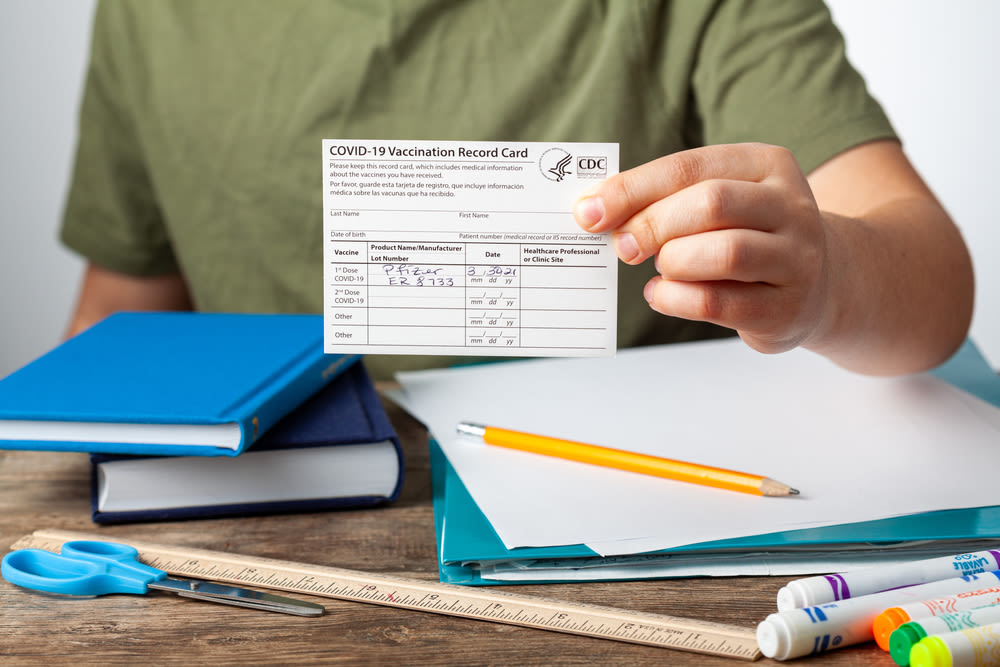Six Weeks Ago, a Vaccine Mandate for PPS Seemed Like a Lock. No More.

The discussion about vaccine mandates at Portland Public Schools has been tabled, for now.
Image: grandbrothers/Shutterstock
Back in early September, Portland Public School Board member Amy Kohnstamm tweeted approvingly about the Los Angeles Unified School District’s decision to require proof of COVID-19 vaccinations for students ages 12 and up.
Jonathan Garcia, the chief of staff to Portland Schools Superintendent Guadalupe Guerrero, quickly followed up with a lengthy memo endorsing a similarly broad-based vaccination mandate in Portland. During nuanced discussions at an October board meeting, Kohnstamm and a majority of her fellow board members seemed ready to sign off.
But now, just weeks later, the momentum behind a mandate has fizzled out. Late this past Friday night, Garcia sent out a revised memo, saying that discussion on a mandate should be tabled for at least six months. On Tuesday night, in a turn-down-the-temperature discussion, the board accepted his recommendation—only student representative Jackson Weinberg was in dissent, saying that for him and his fellow students, “there is a difference between being safe and feeling safe going to school.”
It’s a speedy reversal for the district, which for awhile seemed on track to be the first outside of a handful of California school districts to move forward with a broad-based mandate for the current academic year and would likely have set the stage for other districts in Oregon to follow suit.
So: What stopped the plan in Portland—for now—and what’s next?
Almost as soon as the district floated the possibility of a mandate, there was pushback and support from different corners, but no consensus. Online listening sessions drew mostly parents opposed to a vaccine mandate—including a big turnout from an anti-mandate Russian-speaking population in the Kelly Elementary School catchment area of outer Southeast Portland—while emails to the district ran mainly in favor of requiring the vaccine.
Meanwhile, COVID-19 cases both in Multnomah County and statewide have been on a steady decrease from their late August peak, declining in 10 of the last 11 weeks, with COVID-related hospitalizations cut in half as well, a factor that Garcia has said removed some of the urgency behind moving quickly on a mandate.
Another factor that the district said contributed to their decision to hit the brakes: High vaccination uptake among under-18s locally, even with no mandate. More than three in four 12-17 year-olds in Multnomah County have gotten their vaccine, and 20 percent of 5-11 year-olds have already gotten their first shot since becoming eligible two weeks ago.
Something else that slowed the momentum: Pushback from three of seven school board members, including the two newest members of the board, Herman Greene and Gary Hollands, both of whom expressed serious reservations about a mandate at an October board meeting. Greene and Hollands—both with backgrounds as volunteers in the Black community—pressed district staff to spell out concrete plans for kids excluded from public school because their families opted them out of vaccination. The district shouldn’t move forward with a mandate, they said, at least until that answer was clear.
“People were saying that they wanted to make the choice—that they didn’t want the district to make the choice for them, because we are not medical experts,” Greene said on Tuesday.
Feedback from Multnomah County’s public health team played into the district’s decision to push pause too, Garcia said at Tuesday night’s meeting; he also suggested that conversations about a statewide mandate are underway in Salem, given that it is the Oregon Health Authority that has set past rules about immunization requirements for public schools, and not individual districts.
“One of the things that we heard from the Multnomah County Director of Public Health is that a requirement for vaccination should be the last resort after public health agencies have exhausted all types of engagement with the broader community,” Garcia said.
Looming over it all: The very real possibility that pushing forward, particularly with vaccines for kids still under an emergency use authorization only, could have brought an expensive legal battle to the district’s doorstep, as has happened in Los Angeles and San Diego; President Biden’s vaccine mandate for private employers is also facing court challenges. Notably, very few other major school districts have followed in California’s footsteps, though a handful have vaccine requirements in place for participation in extracurriculars like athletics and band.
For now, a decision on any mandate would not affect kids until September of 2022, at the earliest, and would most likely include exemptions for religious and philosophical reasons, but that doesn’t mean the conversation is done. Weinberg, who presented the results of a district student council survey showing that middle and high school students were by and large supportive of a mandate says that without one, PPS and the state need to move much faster on proposals for a “test to stay” program to cut back on disruptive quarantines, and ramp up COVID screening efforts.
And Kohnstamm said Tuesday she’s still interested in talking about a mandate for voluntary extracurriculars that require close indoor contact, a strategy in place in New York City, Washington DC, and several other major districts.




